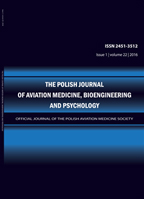2013, Volume 19, Issue 3
Psychophysiology of Spaceflight and Aviation
Patricia S. Cowings1
-------------------------------------------------------------------------------------------------
1Ames Research Center, NASA
Autor korenspondencyjny: Patricia S. Cowings; Ames Research Center, NASA; email: patricia.s.cowings[at]nasa.gov
Full text
Streszczenie
In space, the absence of gravity alone causes unique physiological stress. Significant biomedical changes, across multiple organ systems, such as body fluid redistribution, diminished musculoskeletal strength, changes in cardiac function and sensorimotor control have been reported. The time course of development of these disorders and severity of symptoms experienced by individuals varies widely. Space motion sickness (SMS) is an example of maladaptation to microgravity, which occurs early in the mission and can have profound effects on physical health and crew performance. Disturbances in sleep quality, perception, emotional equilibrium and mood have also been reported, with impact to health and performance varying widely across individuals. And lastly, post-flight orthostatic intolerance, low blood pressure experienced after returning to Earth, is also of serious concern. Both the Russian and American space programs have a varied list of human errors and mistakes, which adversely impacted mission goals. Continued probability of human exposure to microgravity for extended time periods provides a rationale for the study of the effects of stress. The primary focus of this research group is directed toward examining individual diff erences in: (a) prediction of susceptibility to these disorders, (b) assessment of symptom severity, (c) evaluation of the eff ectiveness of countermeasures, and (d) developing and testing a physiological training method, Autogenic-Feedback Training Exercise (AFTE) as a countermeasure with multiple applications [1]. The present paper reports on the results of a series of human flight experiments with AFTE aboard the Space Shuttle and Mir Space Station, and during emergency flight scenarios on Earth.
Słowa kluczowe
aerospace medicine, aerospace medicine, countermeasures, countermeasures, feedback, feedback, human performance, human performance, manned space flight, manned space flight, microgravity, microgravity, motion sickness, motion sickness, physiological effects, physiological effects, physiology
